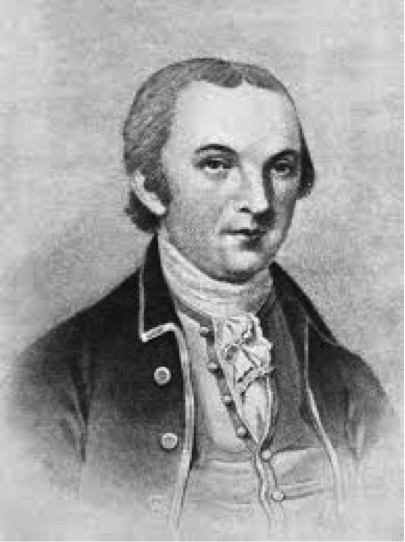
Laura's Blog

Uncle Johnny, the “ Good Dr. Bones”
March 12, 2018

Today—in anticipation of my upcoming reading on St. Patrick’s Day (at Reston’s Scrawl Bookstore http://www.scrawlbooks.com/event/celebrate-saint-patricks-day-l-m-elliott) —I’d like to introduce you to one of my favorite “minor characters” in HAMILTON AND PEGGY!, Peggy’s Uncle Johnny Cochran. Cochran is so representative of the wave of Scot-Irish immigrants who’d fled the British Isles right before our Revolution and swelled the ranks of our Continental Army. Their fierce dislike of the English king and parliament made them brave and loyal patriot-soldiers. (By 1780, nearly a quarter of our Continental soldiers were recent Irish immigrants.)
The good-natured, even impish, surgeon seems to have received his nickname “The Good Dr. Bones” from the ardent young patriot, the Marquis de Lafayette. Cochran was quite the singer and dancer, a buoyant personality at dinners and parties who loved to regale his listeners with a humorous song featuring the refrain “bones, bones, bones.”
He and the effusively affectionate Lafayette became very close after Cochran saved the 20-year-old Frenchman’s life at the Battle of Brandywine. Shot through the calf, Lafayette was bleeding profusely overtop his knee-high boot. Cochran hastily bandaged the wound to staunch the hemorrhaging as the British rushed toward them. He then managed to drag Lafayette away, evading being captured only at the last minute. Lafayette was carried to a nearby house for Cochran to extract the bullet as the battle raged nearby. As he prepared to operate, George Washington told Cochran to care for Lafayette as if he were George’s own son. No pressure or anything!
Cochran saved Lafayette’s life again in 1778 when the Frenchman was struck down with a harrowing bout of pneumonia, which was followed by a bit too much merrymaking at the Boston home of Angelica and her husband John Carter! Lafayette was supposed to be on his way back to France to plead with King Louis to send French forces to aid the Patriots. After a month of partying, Cochran finally extracted Lafayette, and got him safely onto his ship and well enough to make the crossing. Not without his own bit of over-partying, however. Evidently, Cochran’s gold watch had to be auctioned off in order “to save the Doctor blushes from the recollection of the circumstances,” as described by his friend, General “Mad Anthony” Wayne. (Look for Angelica to make use of that embarrassment in Chapter Nine!)
Cochran became part of the Schuyler clan by marrying Philip’s older sister, Gertrude. Cochran always lovingly called her “Gitty.” They’d met over the surgery table during the French and Indian War. Following a fierce fight at Fort Ticonderoga, the ancestral home of the Schuylers’ on the Flatts near Albany had been hastily turned into an emergency hospital, its dining room table serving as an improvised operating gurney. Completely untrained for such bloody work, the Schuyler women nonetheless joined the rushed triage as stand-in nurses. Cochran quickly admired the “charm and efficiency” of his future bride in dealing with the patients. Especially with General Charles Lee, who even in that war, seemed a bit of a problem. Wounded seriously—a musket ball having shattered two ribs—Lee reportedly made treating him even more difficult by shouting oaths at anyone who came near him.
Cochran’s first action in the Revolution was to cross the Delaware River to Trenton with Washington. The general quickly came to trust and befriend Cochran, who became his and Martha’s personal physician during the war. After overseeing the crucial inoculation of the army against smallpox, Cochran was promoted to be its director general. His letters to Congress and state officials demanding medical supplies for his patients reveal a man with no fear of authority or of calling a spade a spade. I can’t tell you how many times I burst out laughing at reading his colorful language and his spot-on label for bureaucrats and politicians who refused to send what his hospital desperately needed: “humbugs” and “the most cussidest nincumpoopas” he railed.
I suspect that occasionally Cochran might have teasingly hit Hamilton with a few choice words as well. Eliza was staying with her uncle Johnny and “Gitty,” when Hamilton was struck through the heart by her. More than once Cochran came home exhausted from a long day at the Morristown encampment’s hospital, wanting to stretch out on the couch in front of the fire as he awaited his late supper, only to find it already occupied by the lovers.
After the war, Lafayette gave him a pair of pistols (and a watch!), and Mad Anthony his sword hilt, which Cochran had turned into six silver goblets. Raise a glass!
I also suspect that he and Peggy, “the wicked wit,” were kindred souls in their quick no-nonsense assessment of people and light-hearted, droll commentary. He was an absolute delight to write into her narrative, offering many moments of tender and doting humor.

Other Blog Posts
Click Here to See All of Laura's Blog Posts
